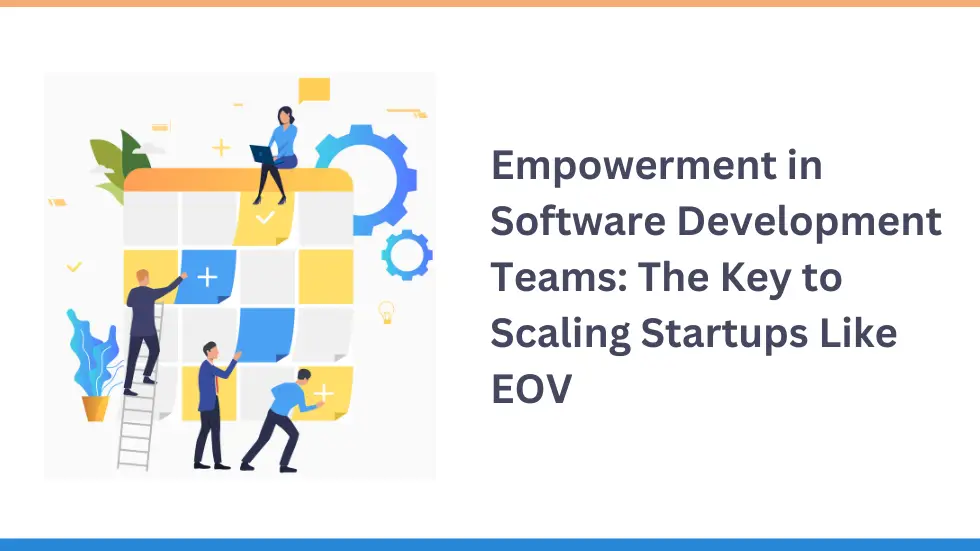In today’s fast-paced tech world, innovation and agility are everything. For software startups and enterprise tech teams alike, success doesn’t just hinge on great code—it depends on building teams that are empowered to act, think, and lead.
EmbarkingOnVoyage (EOV) is a prime example of how the right internal culture—centered around empowerment in software development teams—can turn a struggling startup into a thriving tech company in less than five years.
Why Empowerment Matters in Software Development Teams
Building software isn’t just about engineering—it’s about problem-solving, ownership, and adaptability. When team members are empowered, they make smarter decisions, innovate faster, and own the outcomes.
At EOV, empowerment wasn’t a buzzword—it was a strategy embedded in the company’s DNA.
Phase One: Accountability as the Foundation
Before empowerment could flourish, EOV needed structure. Like many early-stage startups, the company grappled with chaotic workflows, stretched resources, and fluid roles. That’s where accountability in software teams came into play.
EOV’s Accountability Framework:
- Clear Expectations: Everyone—from interns to founders—knew their responsibilities and KPIs.
- Goal Transparency: EOV used OKRs or similar frameworks to align teams across departments.
- Regular Check-Ins: Not micromanagement, but collaborative check-ins to solve roadblocks together.
- Leadership by Example: Founders took ownership of delays or mistakes, encouraging team members to do the same.
This environment made it easier to foster ownership, communication, and trust—key traits in high-performing development teams.
Phase Two: Building Empowerment in Software Development Teams
Once accountability was strong, EOV shifted its focus to team empowerment in tech—unlocking the creativity and leadership potential of every team member.
How EOV Empowered Its Development Teams:
🔹 Trust-First Culture
Empowerment begins with trust. EOV hired smart, capable people and gave them room to operate. There were fewer approval layers and more direct decision-making at the operational level.
🔹 Growth Through Learning
From mentorship programs to stretch assignments, EOV prioritized professional development. The leadership believed that empowerment without training leads to confusion, so they invested in their people’s skills constantly.
🔹 Permission to Fail Forward
EOV created a safe space to experiment. If something failed, it wasn’t about assigning blame. It was about identifying what went wrong, learning from it, and trying again—stronger.
🔹 Radical Transparency
Software teams need context to make decisions. EOV openly shared strategic updates, financial insights, and product roadmaps with the entire team. This encouraged informed decisions at every level.
🔹 Giving Everyone a Voice
EOV welcomed ideas from all roles, not just leadership. Some of the company’s best product innovations came directly from empowered developers and team members on the ground.
From Chaos to Clarity: EOV’s Growth Milestones
The culture of accountability and empowerment in software development teams drove real results.
🚀 Years 0–2: Survival Through Structure
During the early, volatile years, accountability helped keep projects on track and maintained team morale. Without it, chaos might have sunk the ship.
⚙️ Years 2–4: Rapid Innovation and Market Pivot
Empowered team members identified customer pain points, pivoted features quickly, and contributed to product-market fit. Leadership didn’t need to micromanage decisions—because the team had already taken ownership.
📈 Years 4–5: Scaling Without Breaking Culture
As EOV grew, they onboarded new talent into a culture that was already high-performing. Empowered team leaders took charge of new initiatives and helped scale the company’s offerings without creating bottlenecks.
The Business Case for Empowerment in Tech Teams
EOV’s story shows that empowerment isn’t a luxury—it’s a business necessity.
Here’s What They Gained:
- Higher Employee Retention: People stayed because they felt their work mattered.
- Faster Time to Market: Empowered developers didn’t wait for instructions—they led with solutions.
- Increased Innovation: With no fear of failure, creativity surged across teams.
- Stronger Collaboration: Accountability fostered trust, and empowerment turned that trust into shared wins.
- Resilience to Change: EOV responded to market shifts quickly—because the entire team was agile and aligned.
How You Can Replicate EOV’s Success
Whether you’re a tech startup or an enterprise looking to revamp your software development approach, here’s how to apply EOV’s playbook:
- Start Early with Intentional Culture: Don’t wait for cracks to appear—embed accountability and empowerment from day one.
- Define Roles and Results Clearly: Let every developer and team member know how their work drives the company forward.
- Trust and Train Simultaneously: Trust is essential, but so is capability. Invest in upskilling and mentorship.
- Create Safe Zones for Innovation: Let people experiment. Celebrate what works and learn from what doesn’t.
- Model the Culture from the Top: Leaders must embody the behaviors they want to see.
- Celebrate Successes—Big and Small: Recognition reinforces the behaviors you want to multiply.
Final Thoughts: Culture Is Your Competitive Edge
EOV didn’t scale because of a viral app or massive funding—they scaled because they built a culture that worked. A culture grounded in empowerment in software development teams.
In a world chasing technical breakthroughs, EOV proves that human-centric practices like trust, ownership, and team empowerment are what truly drive innovation and sustainable growth.
Additional Resources:
